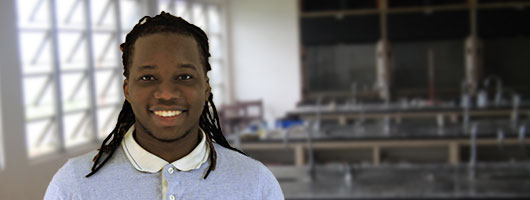 Pictured | John Banda | Biochemistry | Maputo, Mozambique (hometown)
Pictured | John Banda | Biochemistry | Maputo, Mozambique (hometown)
About the Bachelor of Science in Biochemistry
The breadth and multidisciplinary nature of the curriculum allows students to pursue their scientific interests while offering the flexibility to tailor their program to their career aspirations. Graduates with a Bachelor of Science in Biochemistry are prepared for graduate studies in biochemistry, molecular biology, pharmacology, biotechnology, environmental chemistry, polymer chemistry, drug design and delivery, genetic engineering, and a variety of other fields. Many graduates pursue additional studies in medical fields including medicine, veterinary medicine, pharmacy, dentistry, optometry, physician assistant, etc. Other graduates obtain rewarding jobs in industry, including biotechnology, toxicology, environmental testing, food science and nutrition, essential oils, drug and diagnostic test production, etc.
Academic Advising
College policy on advising requires that students meet with their academic advisors at least once each year, and in some departments, prior to each semester’s to enrollment. Advising holds are placed on all College of Liberal Arts and Sciences students prior to advance registration and are released following advising appointments. Students with a declared major are advised in their academic units. To determine who your advisor is and how to contact them, see One.IU.
Degree Requirements (120 cr.)
Degree Map >>
All courses are 3 credit hours, unless otherwise designated.
Students receiving the Bachelor of Science degree in Biochemistry must complete 120 total credit hours including:
- Math courses required for the BS in Biochemistry fulfill the Quantitative Reasoning requirement.
- World Language | At least one course at the 200-level or higher, or formal training, as evidenced by secondary or university diplomas, in a language other than English. The Department of World Language Studies (W.L.S.) offers a placement examination to determine into which semester a student should enroll and/or to qualify students for credit by examination. (3-9 cr.)
- Major Requirements (73-75 cr.)
- Free Electives (balance of credits needed to equal 120 credit requirement)
- Minimum of 30 credit hours at the 300- or 400-level.
- Courses required for the major must be completed with a grade of C– or higher.
- A minimum CGPA of 2.0 is required.
Major Requirements (73-75 cr.)
All courses are three credit hours, unless otherwise designated.
Biology (11 cr.)
- BIOL-L 102 Introduction to Biological Sciences 2 (5 cr.)
- BIOL-L 211 Molecular Biology
- BIOL-L 312 Cell Biology
- BIOL-L 319 Genetics Laboratory
Chemistry (33 cr.)
- CHEM-C 105 Principles of Chemistry I
- CHEM-C 106 Principles of Chemistry II
- CHEM-C 125 Experimental Chemistry I (2 cr.)
- CHEM-C 126 Experimental Chemistry II (2 cr.)
- CHEM-C 301 Chemistry Seminar 1 (1 cr.)
- CHEM-C 341 Organic Chemistry Lectures 1
- CHEM-C 342 Organic Chemistry Lectures 2
- CHEM-C 343 Organic Chemistry Laboratory 1 (2 cr.)
- CHEM-C 344 Organic Chemistry Laboratory 2 (2 cr.)
- CHEM-C 361 Physical Chemistry of Bulk Matter (4 cr.); OR
CHEM-C 362 Physical Chemistry of Molecules (4 cr.) - CHEM-C 484 Biomolecules and Catabolism
- CHEM-C 485 Biosynthetic Pathways and Control of Metabolism
- CHEM-C 486 Biological Chemistry Laboratory (2 cr.)
Mathematics (10 cr.)
- MATH-M 215 Calculus (5 cr.)
- MATH-M 216 Calculus II (5 cr.)
Physics (10 cr.)
- PHYS-P 221 Physics 1 (5 cr.)
- PHYS-P 222 Physics 2 (5 cr.)
Electives (9-11 cr.; 3 cr. from Biology)
All courses are three credit hours, unless otherwise designated.
Biology
- BIOL-L 280 Introduction to Bioinformatics
- BIOL-L 311 Genetics
- BIOL-L 313 Cell Biology Laboratory
- BIOL-L 317 Developmental Biology
- BIOL-L 321 Principles of Immunology
- BIOL-L 323 Molecular Biology Laboratory
- BIOL-M 430 Virology Lecture
- MICR-M 310 Microbiology
- MICR-M 315 Microbiology Laboratory (2 cr.)
Chemistry
- CHEM-C 310 Analytical Chemistry (4 cr.)
- CHEM-C 362 Physical Chemistry of Molecules (4 cr.)
- CHEM-C 410 Principles of Chemical Instrumentation (4 cr.)
- CHEM-C 430 Inorganic Chemistry
Mathematics
- MATH-M 301 Linear Algebra and Applications
- MATH-M 311 Calculus 3 (5 cr.)
Research (Permission required from program director)
- CHEM-C 409 Chemical Research (1-3 cr.)
- BIOL-L 490 Individual Study (1-3 cr.)
Photo credit | mjmkeating via Flickr | cc